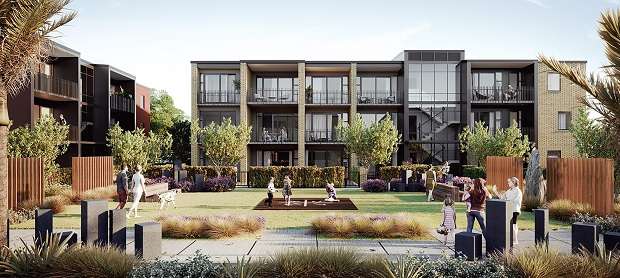For many first home buying couples, getting a foothold on the property ladder can be challenging even on a dual income, so what are the options when you're single?
You'd expect that if you're single and on an average income the dream is likely unattainable in most major metros, but that isn't necessarily the case, according several property market experts OneRoof talked to.
Pete Evans, Colliers International's national director of residential projects, says almost half of the new-build buyers Colliers sells to are single people.

Start your property search
An artist's impression of the Fraser Ave apartment development in Northcote, Auckland. They are proving to be popular with single home buyers. Photo / Supplied
Of the 145 newly built terraces and apartments that Colliers has marketed in the last two years, 70 were sold to single people.
Evans says single buyers aged 25 to 30 have been very active in the new-build market in Auckland.
“About three years ago, when the prices were going out of control, auction rooms were full of investors with cash, and first home buyers could not even get a chance,” he says.
The most in-demand new-build for Auckland singles, he says, are three-bed, one-bathroom terraces for $650,000. which buyers fill up with flatmates.
“If you want a three-bedroom affordable home, you move further away from the city. If you want a two-bedroom, you will be in the suburbs but closer to amenities.
“And if you want an apartment, the size will be smaller and there are not a lot available.”
Mortgage Lab chief executive Rupert Gough says about one quarter of his clients applying for mortgages are single.
“You’re relying on one income so it’s more difficult. But you are going to enjoy the experience of having flatmates a lot more, as that extra income will not make it horrible,” he says.
Single people normally drive one car, spend less on groceries but living on one income also means a longer saving time.
Singles in their early 30s normally have enough saved for a 10 to 20 per cent deposit on the house. Gough suggests that once they have saved for the deposit, single home-owners should consider having flatmates, as that weekly rent will help with mortgage payments.
“Singles are more open to having flatmates than couples and some banks allow up to two flatmates to help them get the income they need to get that mortgage,” he adds.
Gough says singles normally apply for mortgages on apartments or terrace homes rather than standalone homes.

Shane Brealey, of NZ Living, says that nearly one third of buyers of his affordable housing projects are single people. Photo / File
NZ Living, which is building 42 apartments in the central Auckland suburb of Onehunga and 86 more in Otahuhu, South Auckland, says about 30 per cent of its buyers are single and the rest are couples purchasing their first home.
Managing director Shane Brealey says: “Apartments are selling like hot cakes. We’re selling out within weeks of launch.”
NZ Living launched the Awataha Drive development in Northcote with 27 apartments and only had two left a week later, Brealey says.
Such demand comes off the back of low interest rates and mortgage payments being about as high as rent payments, he says.
“There’s a lot of uncertainty in the world right now and people want a safe bolthole. When you have safe four walls around you, I notice people are saying: ‘at least I have my own place’,” he says.
Not all single buyers are in their 20s.
Some people go through a divorce, other retire alone but on average NZ Living’s buyer is just over 29 years old.
Brealey says that while it keeps getting harder to enter the market as a single, particularly without parents' financial help, it also keeps getting harder for developers to build, which means the supply is not keeping up with the demand.
“In my experience, with the market property prices they just grow, they don’t go backwards and the banks are not backing developers as much as they used to. They are taking a low risk approach.”











































































